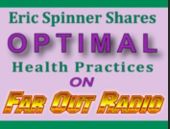Natural Aternatives for A.D.D. & A.D.H.D.
By Eric M. Spinner, CNC
I very often have people come in to see me with questions regarding ADD. They tell me that their children’s teachers are encouraging them to take medications like Ritalin and Adderall, but that they would like to try a more natural approach before starting with the prescription drug. I know from speaking with faculty members at our local schools that a huge problem exists, and I am writing this to hopefully offer an alternative to those who can benefit from it.
I always believe in an integrated approach to health and healing, Integrating the best of conventional medicine with traditional complimentary medicine. I never encourage clients to discontinue taking their prescription medicines without first speaking to their doctor.
Attention deficit disorder (ADD), and attention deficit hyperactivity disorder (ADHD) can affect people of all ages, and it is estimated that over 6 million children have been diagnosed with ADD/ ADHD in this country. It is by far the fastest growing problem affecting children in America. It is responsible for a variety of learning and behavioral problems, quite often affecting not only the child, but also making it difficult for the entire family.
Factors involved with the development of ADD include heredity, food allergies, anxiety, artificial food additives and colors, infection, and pre-natal trauma. Even though this disorder is classified as a learning disability, I find that the individual is often of average or above-average intelligence, and is highly creative as well. Symptoms of ADD include difficulty in solving problems, trouble concentrating, distractibility, forgetfulness, inability to remember sequences, lack of goals, mood swings, disruptiveness, and sleep disorders.
I first recommend that we change our child’s diets to include more whole grains, fresh fruits and vegetables, and protein from eggs, meats and fish, and to limit junk foods, (food that contains artificial flavors and colors), and refined sugars and flours as well. I find that many children eat a high carb breakfast, or none at all, and by lunchtime they are unable to think clearly. Try to balance out the carbs by incorporating more protein into their diet.
I also like to start with some nutritional basics, a natural multi vitamin extra vitamin C, and calcium & magnesium. Dosage is based on age and body weight. In addition to these basics, I have found that DHA (docosahexaenoic acid), and PS (phosphatidyl serine) are among my two favorite nutrients to elevate brain function. Additional zinc may also be useful. Deficiencies in calcium, magnesium, and zinc have been shown to contribute to ADD. I will sometimes include additional B-complex vitamins into the mix, beyond what is found in a multi vitamin.
If hyperactivity is an issue than the use of calming herbs such as chamomile or valerian root, and homeopathic remedies like Hyland’s Calms Forte can be helpful. I have had many parents come back to me to say that their child’s teacher asked if they had put their child on medication, and the parent’s response was “No, just vitamins!”
There is no “one size fits all” approach to dealing with this growing situation, but by asking the proper questions I can usually tailor a program that is right for the individual.
If you have any questions please contact me at:
Stay well! – Eric Spinner, C.N.C.
